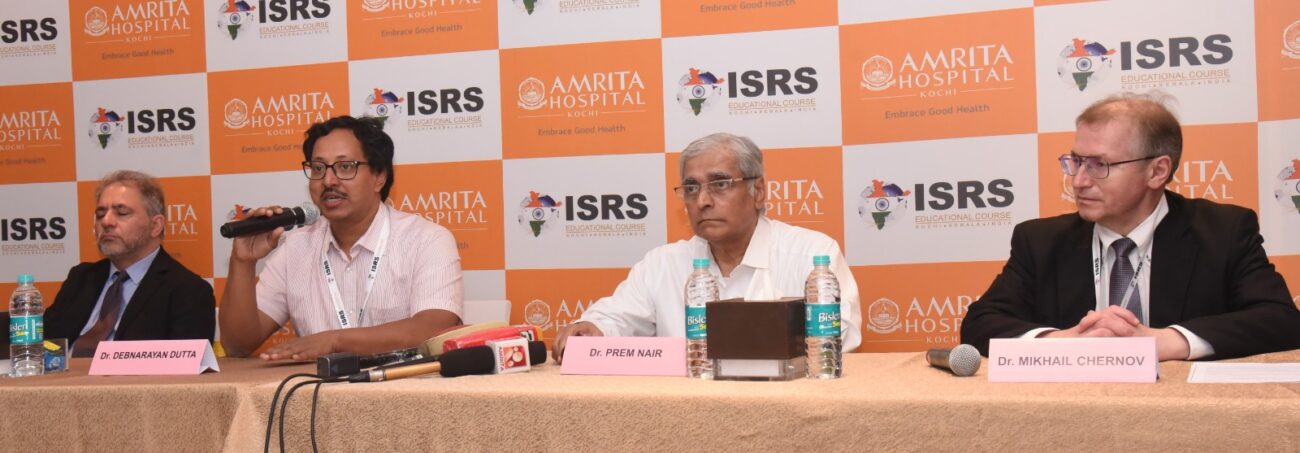Experts Recommend Radiosurgery as Standard of Care for Indian Patients
India's first Educational Course of the International Stereotactic Radiosurgery Society hosted at Amrita Hospital, Kochi Amrita Hospital, Kochi marked a milestone on Thursday (August 24), as distinguished medical experts strived towards revolutionizing radiosurgery practices in the

India’s first Educational Course of the International Stereotactic Radiosurgery Society hosted at Amrita Hospital, Kochi
Amrita Hospital, Kochi marked a milestone on Thursday (August 24), as distinguished medical experts strived towards revolutionizing radiosurgery practices in the country during the first day of India’s first educational course in association with the International Stereotactic Radiosurgery Society.
The course titled, “Advancements in Stereotactic Radiosurgery for Managing Benign Intracranial Tumors, Skull Base Tumors, and Abdominal Genitourinary and Gynecological Cancers: A Comprehensive Radiosurgery Educational Course,” aims to disperse knowledge of radiosurgery and stereotactic radiotherapy among neurosurgeons, oncologists, medical physicists and students, and residents with a vision to manage and eradicate benign intracranial tumours, skull-based tumours, and genitourinary malignancies.
Research on radiosurgery has predominantly originated from international centers abroad, with Western countries offering a unique perspective. Radiosurgery, known for its concise treatment duration—some cases requiring only six weeks—offers convenience for patients. Typically, those from higher income brackets choose radiosurgery as their preferred treatment option. This led to a presumption that radiosurgery might not be as cost-effective in countries like India due to the relatively brief treatment period compared to the associated expenses. Nevertheless, studies carried out in India, including research at Amrita Hospitals, have challenged this assumption. These studies have demonstrated substantial advantages in terms of improved quality of life and treatment outcomes. It’s evident that the significance of radiosurgery in India is on par with its importance in Western nations.
According to a study conducted by Amrita Hospital, a cohort of 138 brain metastasis patients with a total of 251 lesions underwent exclusive radiosurgery treatment, omitting whole brain radiotherapy. With a median follow-up duration of 15 months, the study revealed that 60% of patients achieved controlled brain lesions at the 12-month mark, while this figure remained at 30% at 24 months. Furthermore, radiation necrosis, a potential adverse effect, was observed in only 9% of patients. These outcomes closely mirrored data from Western literature, affirming the viability of focal radiation therapy with Stereotactic Radiosurgery (SRS) as a valid and standard option for Indian patients.
Dr. Debnarayan Dutta, Professor and Head of the Department of Radiation Oncology, Amrita Hospital Kochi, who is the driving force behind the initiative, which has been endorsed by esteemed medical institutions including the Indian Society of Neuro-oncology (ISNO), Cochin Oncology Group (COG), Association of Radiation Oncology, India (AROI), Neurological Society of India (NSI), and Indian Society of Stereotactic and Functional Neurosurgery (ISSFN), said “All these patients have undergone protocol-based surgery, and over the past five years, we have collected data on patients with conditions like brain metastasis and liver tumors. Through our research and studies, we have established that Indian patients opt for similar treatments as Western countries. Multiple brain metastases are commonplace in Indian patients. The prevalence of young patients with brain metastasis aligns with that in Western countries.”
Professor Rakesh Jalali from Apollo Proton Cancer Centre in Chennai debunked the idea that radiosurgeries might lack cost-effectiveness in India. He stated, “There was a prior belief that radiosurgeries might not be cost-effective in countries like India due to shorter treatment durations and costs. However, research conducted in India has refuted this notion. Studies indicate that radiosurgery holds equal importance in India as it does in Western countries, highlighting significant cost-effectiveness, treatment quality, and efficacy.”
The three-day event held by Amrita Hospitals (Kochi and Faridabad) was inaugurated by Dr. Prem Nair, Group Medical Director of Amrita Hospitals and Provost- Amrita Institute of Medical Sciences. Dr. Mikhial Chernov, Chair of the ISRS Scientific Committee, Professor Debnarayan Dutta, and Professor Rakesh Jalali, Department of Radiation Oncology, Medical Director and Head of Apollo Proton Cancer Centre, Chennai, Tamil Nadu were also present at the event.
This one-stop learning opportunity for medical professionals and students in their bid to improve cancer and tumour treatment facilities across India. Using world-class technologies like CyberKnife, which is a non-invasive and painless form of radiosurgery, the event focuses on highlighting the revolutionary potentials of latest advancements in the fields of radiosurgery and oncology being blended with the best medical minds and global organisations.
Reflecting on the significance of this landmark event, Dr. Mikhail Chernov, Chair of the ISRS Scientific Committee, affirmed, “Before establishing new centers worldwide to offer training services and research, ISRS demands a protocol-based treatment checklist. Amrita Hospitals have been conducting radio surgeries in a structured manner for a considerable time, making them an ideal collaborator to offer an ISRS course in India. ISRS remains dedicated to the progress of stereotactic radiosurgery and stereotactic body radiation therapy. This Educational Course underscores our commitment to multidisciplinary education, research facilitation, and the exchange of best practices. We are delighted to support centers that excel in education, training, research, and a protocol-based approach.”
The first day of the educational workshop was also graced with the presence of renowned faculties including Professor Selcuk Peter from the CyberKnife Centre in Turkey, Professor Ian McCutcheon from MD Anderson Cancer Centre, and Dr. Rupesh Kotecha from Miami Cancer Centre, USA.
Dr. Prem Nair, Group Medical Director of Amrita Hospitals, stated, “Amrita Hospital aims to realize Amma’s vision of delivering quality healthcare to everyone at an affordable cost. Through research, innovation, and a science-centric approach, we have introduced specialized healthcare services to offer premier treatment. Radiosurgery is a gift to humanity from Amrita, and we take pride in extending such advanced treatment to our patients.”
The interactive sessions and open forums held over the span of the three-day event will give participants a platform to share perspectives, discuss clinical cases, and cultivate a collaborative learning environment.






